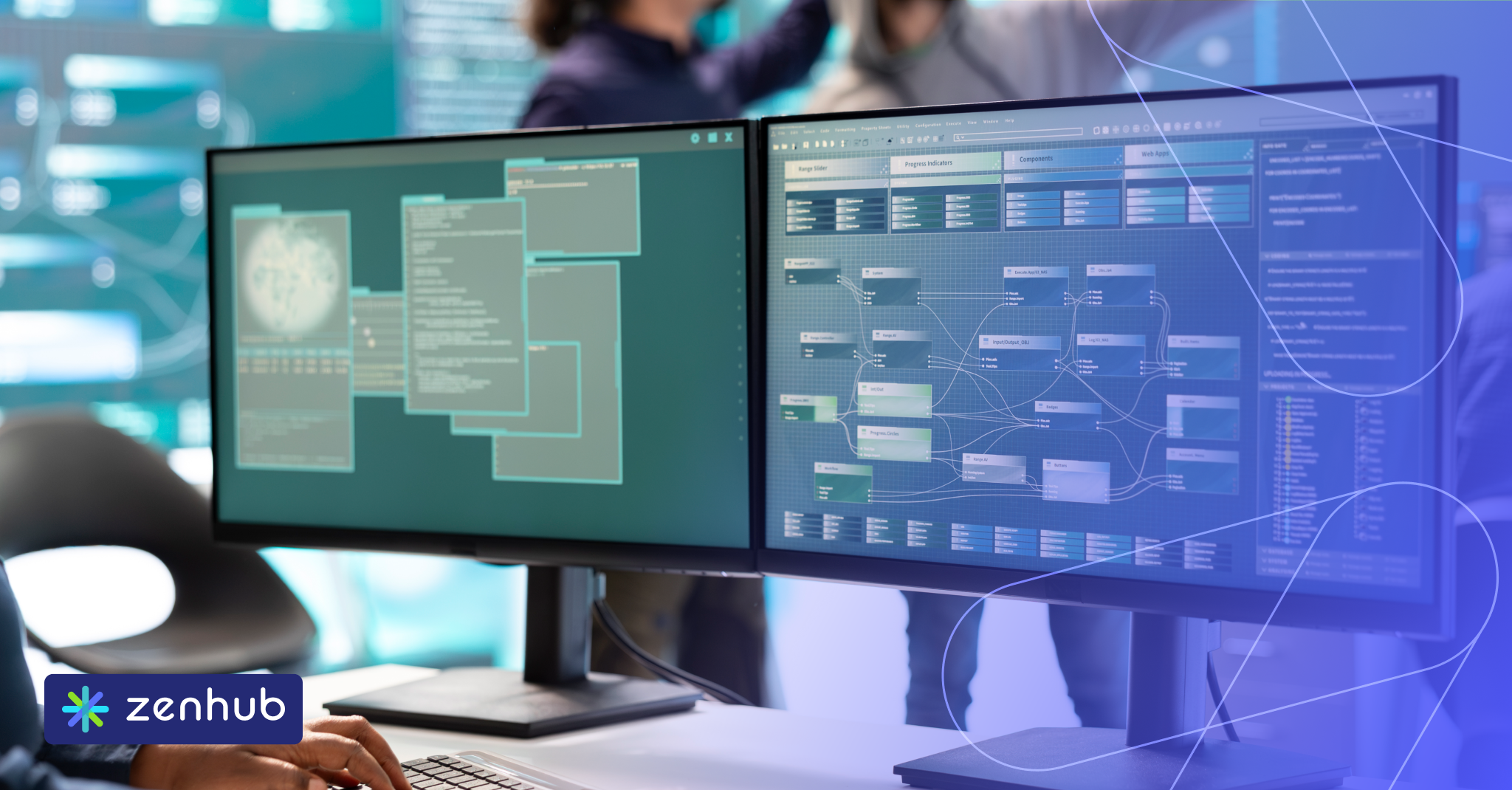Browse topics
Agile teams are constantly pressured to move quickly, but manual estimates, inconsistent velocity, and data spread across too many tools slow them down. Some studies suggest teams lose as much as 10% of their sprint capacity to admin work alone, which is a real hit to productivity and momentum.
AI-powered sprint planning tools are changing that. What started as basic automation has evolved into more intelligent systems that can understand context, spot patterns, and support better decision-making in real time.
In this guide, we’ll walk through some of the best AI-assisted sprint planning tools available today. We’ll look at what each one does well (and where it might fall short) and give you a practical way to figure out which option fits your team best, from GitHub-integrated solutions to full-featured enterprise platforms.
Why AI Is Transforming Sprint Planning
AI represents the natural evolution of agile tooling, addressing the fundamental tension between process and productivity. While traditional agile practices emphasize individuals and interactions over processes and tools, inefficient processes consume valuable time that could be spent on value creation.
According to recent Gartner research, organizations implementing AI-assisted agile tools report up to 40% faster release cycles and a 35% reduction in planning overhead. These gains come from several key improvements:
- Reduced cognitive load on team members
- More accurate estimation based on historical patterns
- Faster identification of dependencies and risks
- Enhanced visibility into team capacity and workload
One engineering leader at Spotify noted, "The difference between our planning sessions before and after implementing AI tools is night and day. What used to take hours now takes minutes, and our velocity—the average story points completed per sprint—has become much more predictable."
Common Sprint Pain Points AI Can Solve
Several persistent challenges plague traditional sprint planning approaches:
- Inaccurate estimations leading to rollover work: Teams consistently underestimate complexity, resulting in unfinished work that carries over to subsequent sprints. AI can analyze historical completion patterns to suggest more realistic estimates.
- Tedious backlog grooming and prioritization: Product owners spend hours manually organizing and prioritizing backlogs. AI tools can automatically identify high-value items, flag dependencies, and suggest optimal sprint compositions.
- Limited visibility into real-time capacity: Teams struggle to account for unexpected time off, competing priorities, and varying skill sets. AI can provide dynamic capacity forecasts that adjust as conditions change.
- Decision paralysis during Planning Poker: The traditional estimation technique, where team members assign story-point values by consensus, often leads to lengthy discussions without clear resolution. AI can suggest baseline estimates based on similar completed work, giving teams a starting point for discussion.
- Insufficient data for continuous improvement: Without centralized metrics, retrospectives lack concrete insights for improvement. AI tools can automatically generate sprint analytics and identify patterns that might otherwise go unnoticed.
Key AI Capabilities That Boost Velocity
The most impactful AI features for sprint planning include:
- Predictive estimation using historical Git data: By analyzing past code commits, pull requests, and issue resolution times, AI can suggest increasingly accurate estimates for similar work (reduces estimation meetings by up to 60%).
- Natural-language ticket summarization: AI can generate concise, consistent user stories and acceptance criteria from rough requirements, ensuring everyone understands the work to be done (saves 2-3 hours per sprint in refinement).
- Automated dependency mapping: By analyzing code repositories and issue descriptions, AI can flag potential dependencies before they become blockers (reduces sprint disruptions by 30%).
- Sprint health forecasts: Real-time burndown and burnup charts with predictive completion trends help teams adjust course mid-sprint (improves on-time delivery by 25%).
- Proactive risk alerts: AI can identify patterns that typically lead to sprint failures and notify teams before problems escalate (reduces failed sprints by 40%).
How We Evaluated the Seven Tools
We developed a comprehensive evaluation framework based on real-world usage scenarios, user feedback, and technical capabilities to identify the most effective AI-assisted sprint planning tools.
Our assessment involved hands-on testing with real development teams, interviews with product managers and engineering leaders, and vendor roadmaps and market positioning analysis. We prioritized tools that deliver tangible benefits for agile teams rather than those merely adding AI features as marketing checkboxes.
Selection Criteria We Used
Data Sources and Research Process
Our evaluation process followed these steps:
- Market analysis: We identified 20+ potential tools through G2, Capterra, and GitHub Marketplace ratings, focusing on those with strong AI components and positive user sentiment.
- Vendor demonstrations: We conducted 30-minute demos with each vendor to understand their AI capabilities, technical architecture, and product roadmap.
- Hands-on testing: We bench-tested each platform using a sample repository with 100 issues across five sprints to evaluate performance in realistic scenarios.
- User interviews: We gathered feedback from current users about implementation challenges, time-to-value, and measurable improvements.
- Feature comparison: We calculated feature coverage and cost per developer to identify the best value propositions.
All evaluations were conducted independently, without vendor sponsorship or influence. We prioritized solutions that deliver real-world benefits to agile teams over those with flashy but impractical AI features.
The 7 Best AI-Assisted Sprint Planning Tools
Based on our comprehensive evaluation, these seven tools represent the best options for agile teams seeking to enhance their sprint planning with AI in 2025.
1. Zenhub
Overview: Zenhub is a GitHub-native, end-to-end agile platform that embeds directly within GitHub's interface. It provides a complete project management solution without forcing developers to leave their workflow environment.
Key AI Features:
- AI summaries automatically generate sprint retrospective content
- Innovative label suggestions based on issue content and team patterns
- Engineering investment reports that track focus areas across sprints
- Automated effort estimation based on historical completion data
- Intelligent sprint planning recommendations
Standout Differentiator: Zenhub's true "in-line" GitHub UI eliminates context switching entirely. Unlike tools that merely integrate with GitHub, Zenhub lives inside the GitHub interface, making adoption frictionless for development teams.
Pricing & Deployment:
- Free tier available for small teams and open-source projects
- Paid plans from $8/user/month
- Available as a cloud service or on-premise deployment
- SOC2 Type II compliant for enterprise security requirements
Ideal For: Developer-first teams prioritizing workflow efficiency and needing rapid rollout with zero onboarding friction. Particularly strong for teams already heavily invested in GitHub.
Customer Proof: Dapper Labs, creators of NBA Top Shot and Flow blockchain, boosted epic completion rates by 40% after implementing Zenhub's AI planning tools, primarily by reducing estimation meetings and improving sprint composition.
Pros:
- Native GitHub experience means immediate adoption by developers
- AI features provide value immediately without extensive setup
- Predictive analytics improve sprint after sprint
- Transparent, project-based pricing (no hidden costs)
- Enterprise-grade security with flexible deployment options
Cons:
- Requires GitHub as primary code repository (not ideal for teams using multiple SCM tools)
- Some advanced reporting features require paid tiers
- Mobile experience is not as robust as desktop
Verdict: Best overall solution for GitHub-centric development teams seeking frictionless AI-enhanced sprint planning.
2. Jira with Atlassian Intelligence
Overview: Jira has evolved from its traditional project management roots to incorporate AI capabilities through Atlassian Intelligence. This suite of AI features aims to streamline agile workflows within the familiar Jira environment.
Key AI Features:
- Automated issue summaries and descriptions
- Intelligent backlog grooming suggestions
- AI-powered sprint composition recommendations
- Natural language query support for finding issues
- Innovative assignment suggestions based on expertise
Standout Differentiator: Jira's mature ecosystem and widespread enterprise adoption make it a safe choice for organizations already invested in Atlassian tools. Atlassian Intelligence extends these capabilities with context-aware AI.
Pricing & Deployment:
- Standard: $7.75/user/month
- Premium: $15.25/user/month (required for full AI features)
- Enterprise: Custom pricing
- Available as a cloud service or self-hosted
Ideal For: Enterprise teams with established Jira workflows and complex governance requirements who need to enhance productivity while maintaining their existing processes.
Pros:
- Familiar interface for existing Jira users
- Comprehensive permission controls for enterprise security
- Extensive customization options for workflows
- Strong integration with the broader Atlassian ecosystem
- Robust reporting capabilities
Cons:
- Steep learning curve for new users
- Heavier administrative burden than GitHub-native tools
- Premium tier required for the most valuable AI features
- Can become expensive at scale
Verdict: Best for large enterprises already committed to Jira who want to add AI capabilities without changing their core platform.
3. Forecast
Overview: Forecast takes a different approach by focusing on AI-powered project management with a strong emphasis on resource allocation, financial forecasting, and agile planning.
Key AI Features:
- AI-driven time and budget estimation
- Automated resource scheduling based on skills and availability
- Sprint planning optimization for balanced workloads
- Financial impact analysis of sprint decisions
- Predictive completion forecasting
Standout Differentiator: Forecast uniquely combines financial management with agile planning, making it especially valuable for agencies and service-based businesses that must balance agile delivery with profitability.
Pricing & Deployment:
- Lite: $29/user/month
- Pro: $49/user/month
- Plus: Custom pricing
- Cloud-based with enterprise security options
Ideal For: Teams that need to connect sprint planning with financial outcomes, especially those working on client projects where budget adherence is critical.
Pros:
- Strong financial forecasting capabilities
- Excellent resource management features
- AI improves with use, learning from your team's patterns
- Visualizes capacity constraints clearly
- Connects technical planning with business outcomes
Cons:
- Higher cost than many alternatives
- Requires significant historical data for optimal AI performance
- Less developer-friendly than GitHub-native options
- Some features prioritize management visibility over team utility
Verdict: Best for organizations that must bridge the gap between agile development practices and financial management.
4. ClickUp
Overview: ClickUp is a flexible work management platform with robust AI capabilities that extend to sprint planning. It aims to be an all-in-one productivity solution that accommodates various work methodologies, including agile.
Key AI Features:
- AI document writing and formatting
- Automated task creation from natural language
- Smart task prioritization suggestions
- Sprint capacity optimization
- Customizable AI workflows for automation
Standout Differentiator: ClickUp's extreme flexibility allows teams to create custom workflows while leveraging AI to reduce administrative overhead. Its broad feature set makes it suitable for cross-functional teams beyond just engineering.
Pricing & Deployment:
- Free plan available with limited features
- Unlimited: $7/user/month
- Business: $12/user/month
- Enterprise: Custom pricing
- Cloud-based with enterprise security options
Ideal For: Organizations looking for a versatile platform supporting multiple departments while providing specific features for agile development teams.
Pros:
- Highly customizable to fit various team needs
- Low entry cost with a free tier available
- Intuitive interface with minimal learning curve
- Strong document collaboration features
- Extensive template library for quick setup
Cons:
- Can feel overwhelming due to feature abundance
- Developer integrations are less robust than specialized tools
- AI features sometimes feel generic rather than sprint-specific
- Performance can slow down with huge projects
Verdict: Best for organizations seeking flexibility across multiple departments while maintaining adequate sprint planning capabilities.
5. Linear
Overview: Linear is a streamlined, design-focused issue tracking and project management tool built specifically for modern software teams. It emphasizes speed, keyboard shortcuts, and a clean interface.
Key AI Features:
- Automatic cycle tracking and analysis
- Smart issue categorization and labeling
- "Linear Insights" AI-powered team analytics
- Predictive milestone forecasting
- Context-aware search and filtering
Standout Differentiator: Linear's lightning-fast interface and opinionated workflow design create a smooth user experience. The AI features enhance this experience rather than adding complexity.
Pricing & Deployment:
- Free tier available for small teams
- Standard: $8/user/month
- Plus: $12/user/month
- Enterprise: Custom pricing
- Cloud-based with limited on-premise options
Ideal For: Speed-focused teams that value a clean, minimal interface and want AI to enhance their workflow without adding complexity.
Pros:
- High-speed, responsive interface
- Beautiful, distraction-free design
- Keyboard-centric workflow increases efficiency
- Native GitHub integration
- Opinionated design encourages best practices
Cons:
- Less customizable than some alternatives
- Limited enterprise-grade features
- Reporting is not as comprehensive as specialized tools
- Limited on-premise options for strict compliance needs
Verdict: This option is best for teams that prioritize speed and simplicity in their agile workflow and want subtle AI assistance rather than heavy-handed automation.
6. GitHub Projects with Copilot
Overview: GitHub Projects provides native project management directly within GitHub, now enhanced with AI capabilities through Copilot integration. This combination offers developers an entirely in-platform experience.
Key AI Features:
- Copilot-driven task generation from issues
- Intelligent grouping and categorization of work items
- AI-suggested issue templates and descriptions
- Automated progress tracking based on commits
- Sprint composition recommendations
Standout Differentiator: As GitHub's native project management solution, Projects offers the tightest possible integration with code repositories. Adding Copilot features brings AI capabilities directly into the environment developers already use.
Pricing & Deployment:
- Included with GitHub Team ($4/user/month)
- GitHub Enterprise: $21/user/month
- Copilot: Additional $10/user/month per user
- Available as a cloud service or self-hosted
Ideal for: Teams fully committed to the GitHub ecosystem that want to minimize tool sprawl and keep everything on one platform.
Pros:
- Native GitHub environment eliminates context switching
- Familiar interface for developers
- Direct access to code and issues in one place
- Continuous improvements from GitHub
- Simple setup with minimal configuration
Cons:
- Limited advanced project management features
- Reporting capabilities are not as robust as dedicated tools
- AI features are still maturing compared to specialized platforms
- May require additional apps for comprehensive reporting
Verdict: Best for teams seeking the simplest possible solution within GitHub while benefiting from emerging AI capabilities.
7. Azure DevOps Boards
Overview: Microsoft's Azure DevOps Boards combines comprehensive project management with powerful development tools. Its AI features focus on delivering enterprise-grade insights and process optimization.
Key AI Features:
- AI-based sprint analytics and forecasting
- Machine learning for effort estimation
- Automated work item classification
- Risk prediction for sprint commitments
- Natural language processing for work item creation
Standout Differentiator: Azure DevOps Boards provides the most comprehensive enterprise-grade pipeline integration, connecting sprint planning directly to build and release processes with AI-enhanced insights throughout.
Pricing & Deployment:
- Basic: Free for five users
- Basic + Test Plans: $6/user/month
- Enterprise: $15/user/month
- Available as a cloud service or self-hosted
Ideal For: Enterprise organizations with complex compliance requirements and teams using the Microsoft technology stack.

%202.svg)













